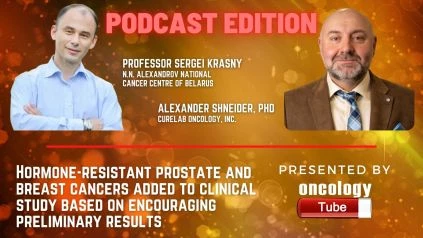Professor Sergei Krasny, MD, DSc, deputy director of the N.N. Alexandrov National Cancer Centre of Belarus and Alexander Shneider, Ph.D., Founder and CEO, CureLab Oncology, Inc. speaks about Hormone-resistant Prostate And Breast Cancers Added To Clinical Study Based On Encouraging Preliminary Results.
Link to Article:
https://www.eurekalert.org/news-releases/924187
The Ministry of Health of the Republic of Belarus has approved extending CureLab Oncology’s ElenagenTM, an investigational DNA treatment, clinical study to include two new arms: 1) hormone-resistant breast cancer and 2) hormone-resistant metastatic prostate cancer. Elenagen was included in the current research because of promising early findings in triple-negative breast cancer and platinum-resistant ovarian cancer patients who received Elenagen in conjunction with conventional chemotherapy.
Plasmids, circular DNAs into which scientists may insert any gene, are one of the most promising groups of novel biological treatments. When plasmids are injected into the body, they enter the cells, and the gene put into the plasmid is expressed, prompting the cell to create the protein represented by this gene.
Dr. Alexander Shneider, the founder of CureLab Oncology and the primary developer of Elenagen, refers to plasmids as “envelopes” and the genes put into them as “letters contained within envelopes.” As a result, Schneider and his colleagues introduced a special genetic letter into a typical plasmid envelope: a gene that produces the p62/SQSTM1 protein, which has a variety of functions in a cell, ranging from misfolded protein targeting to inflammation regulation and cell signaling.
Triple-negative breast cancer (TNBC) is one of the worst diseases, accounting for 10-20% of all breast cancer diagnoses. Patients with advanced Stage IV TNBC who have metastases in distant organs have a five-year survival rate of only 12%.
Cancer patients are enrolled by oncologists at the N.N. Alexandrov National Cancer Centre and the Minsk City Clinical Oncologic Centre, who then administer either conventional chemotherapy or Elenagen chemotherapy. Despite the small number of patients recruited so far, the scientists have been heartened by total and partial responses in several of them. This suggests that both primary tumors and metastases are shrinking, with some even disappearing. The sickness does not go away for some of the patients who were given Elenagen, but it does not advance for a longer period of time than the individuals in the control group. Meanwhile, these patients’ quality of life is still good.
Ovarian cancer patients who had ceased responding to platinum treatments were another category of patients who got Elenagen as an adjuvant to conventional chemotherapy. The median survival time for platinum-resistant ovarian cancer is 9–12 months, and only around 15% of patients respond to further treatment. Although doctors in Minsk have not observed tumors or metastases shrink and vanish in this group as they did in TNBC, the first data show that Elenagen has delayed the disease’s development.
Both study groups’ findings have just been accepted for presentation at the ESMO (European Society for Medical Oncology) meeting.
Women with hormone-resistant breast cancer, unlike TNBC patients, had estrogen receptors in their biopsies at the time of diagnosis. However, the majority of women with breast cancer who react to estrogen therapy first develop hormone resistance and stop responding to treatment. Because this type of cancer has a clinical presentation that is quite similar to TNBC, Minsk doctors decided to incorporate this group of patients as an extra study arm in the ongoing clinical trials.
TNBC and ovarian cancer have certain parallels with metastatic prostate cancer on a molecular and cellular level, including the stage of prostate cancer when the illness is no longer responding to hormone treatment (mCRPC). As a result, the Belarus Ministry of Health has authorized doctors’ plans to test Elenagen as a chemotherapy adjuvant in mCRPC patients.

